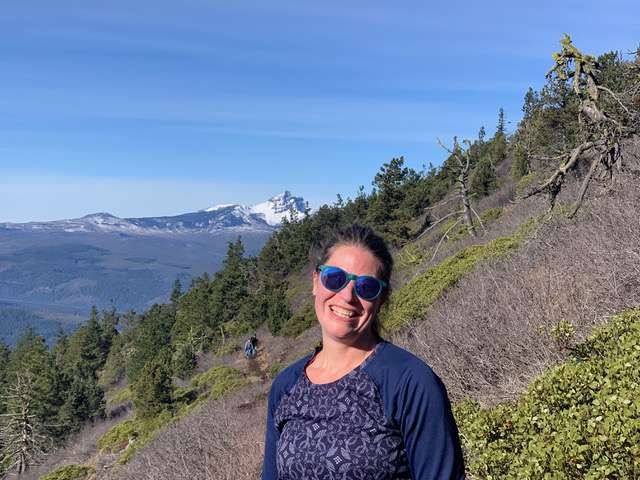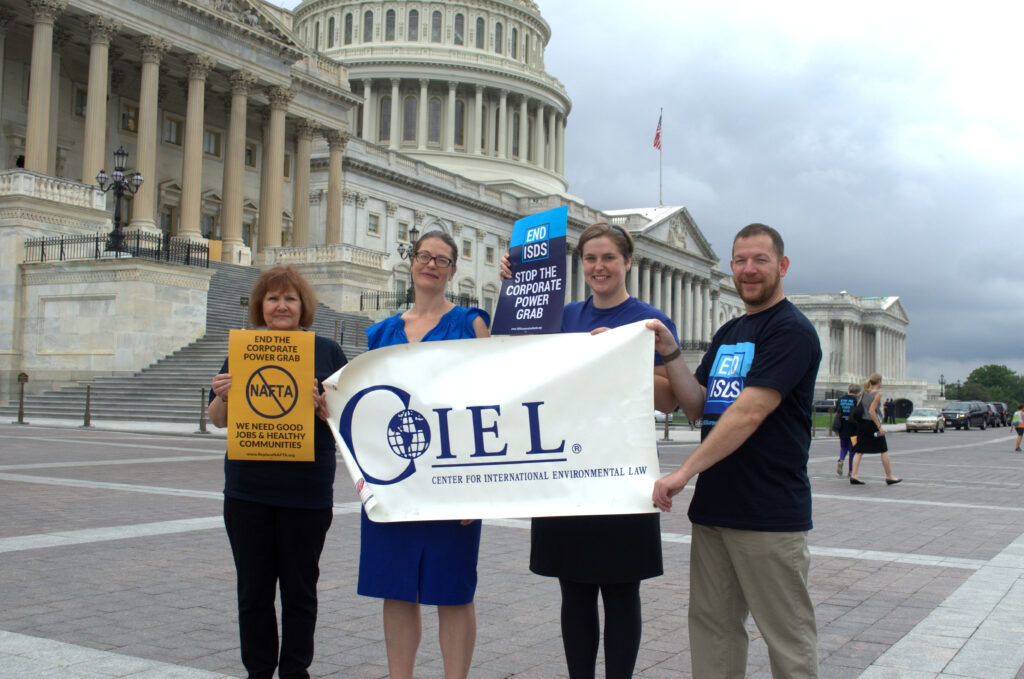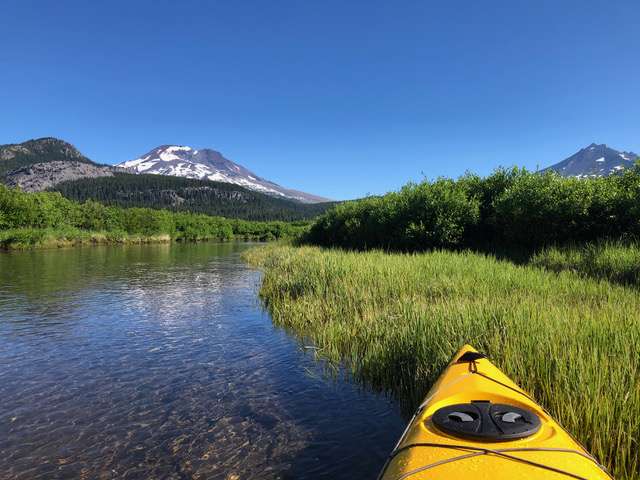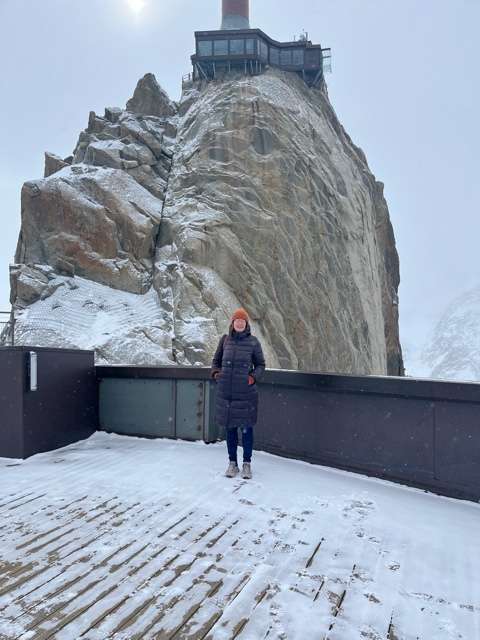
Here at the Center for International Environmental Law (CIEL), we know our strength comes from the people who make up our movement — from our staff, to our partners, to our steadfast supporters. Our “Meet Our Staff” series will introduce you to some of our amazing staff members, who work behind the scenes every day to defend the right to a healthy environment.
Melissa Blue Sky is a Senior Attorney with the People, Land, and Resources (PLR) program at CIEL. She received her BA from Atlantic College and her JD from American University Washington College of Law. She has spent significant time in Latin America, where her work has focused on forests. We spoke with Melissa about what she does here at CIEL, what her North Star is, and more.
What made you get into environmental and human rights work? What led you to join CIEL’s staff?
Melissa: I’ve always been interested in the environment. I graduated high school early and went to a tiny college called College of the Atlantic where everybody gets the same degree: Human Ecology (the study of the interrelationships between humans and the environment). After finishing my undergrad, although I already knew I was interested in law and policy regarding the environment, I was hesitant to go to law school in the US because I didn’t want to have to learn about torts and wills and things I thought I would never use in what I wanted to do. So, I initially pursued a Masters of Law in Law and Development in England because I thought I could just skip law school in the US. It was super interesting and a great experience but only a 12-month program and eventually I did go to law school in the US at American University Washington College of Law. I chose to go there because of their focus on public international law, environmental law, the Sustainable Development Law & Policy publication, and also the opportunity to spend a semester at a law school in Latin America. In law school, I did a number of internships with different organizations including the United States Trade Representative (USTR), Environmental Protection Agency (EPA), and a small boutique law firm during my semester in Chile. However, I had previously worked at NGOs and knew that I wanted to continue, so after graduating and taking the bar exam, I applied for a project attorney position at CIEL focused on drivers of deforestation in the Peruvian Amazon. When the project ended, I transitioned into more international and broader forest work and was fortunate to be able to take on a staff attorney position with CIEL.
What is a typical day like as Senior Attorney with the PLR team?
M: A lot of meetings! I mainly work in partnerships and coalitions with other organizations from all over the world. COVID-19 hasn’t changed my day-to-day meetings that much. There’s coordination of campaigns and strategy, drafting reports, figuring out who’s doing which sections, and we are often doing that through video calls. That all feeds into the other large portion of my day which is researching and writing, whether that be reports, position papers, or proposals.

Do you have any exciting projects you can share (past, present, or future)?
M: Amanda said something along the lines of this: our work is hard and it’s incremental and there are setbacks all the time but it’s so rewarding when progress is made. For example, for the past two meetings of the Conference of the Parties of the Convention on International Trade in Endangered Species of Wild Fauna and Flora (CITES), I’ve supported new tree listing proposals through coalitions, meaning there are new trees that are now protected by CITES. Since CITES is Party-driven and is very dependent on proposals being submitted and approved by Parties, it’s a different working dynamic than NGO campaigns or litigation. There’s a lot of behind-the-scenes work and support and organizing, and so getting things to happen can be really big! Unsustainable and illegal trade in one of the tree species that got listed recently continued, and we are now on the cusp of most, if not all, of the authorized trade being suspended by CITES.
Why do you think the work you do/CIEL does is important?
M: I think it’s a really important and unique role that CIEL plays in the environment and human rights space in that we’re an advocacy organization but really grounded in the law. Unlike a lot of other organizations, we put a lot of focus on basing what we’re calling for on legal expertise and ensuring its accuracy and precision. I think that can be really powerful and make a big difference, especially when working with bigger groups who can amplify our positions and our voices, and we can do the same for them in a different way.
What changes have you seen at CIEL over the past 10 years?
M: Recently, we’ve added more staff, but we have fewer programs because we did a pretty involved strategic planning process a few years ago, and that’s how we ended up with these three programs. We were also in a different office where everybody had their own offices, and then we moved to open space, and during most of 2020 and 2021, we all worked from home, so it’ll be interesting to see what happens when we ever come out on the other side of the COVID-19 pandemic, with more CIEL staff working in different places. We also used to have staff meetings on Monday, which was kind of terrible, so that was another good change: Wednesday staff meetings.
What do you like to do in your free time?
M: In the summer of 2020, we moved to Oregon to be able to do more things outdoors — hiking, kayaking, stand-up paddle boarding, etc. I even tried open water lake swimming last year and have just started mountain biking. I love just being outside in beautiful places often surrounded by big trees. So that’s my North Star!
What book are you reading right now? Or a favorite book?
M: I’ll focus on books related to forests or trees in some way, as those tend to be some of my favorites, both fiction and non-fiction: The Overstory by Richard Powers, The Journeys of Trees by Zack St. George, The Nature Fix by Florence Williams, The Sixth Extinction by Elizabeth Kolbert, Barkskins by Annie Proulx, Sharks in the Time of Saviors by Kawai Strong Washburn, and I recently started Rising: Dispatches from the New American Shore, which mainly focuses on impacts of climate change on the coasts, but one chapter is based in the H.J. Andrews Experimental Forest, not far from where I now live in Central Oregon.
What’s something people would be surprised to learn about you?
I love cross country skiing, and the season can stretch from November to May here — the mountains just got a few more feet of snow in mid-April. It’s so quiet and beautiful in the forest.
If you could have any superpower what would it be and why?
M: Make the world a better place by stopping climate change and war, and also make people listen to each other.

Interviewed by Sarah Street, Communications Intern
Originally posted on May 3, 2022

